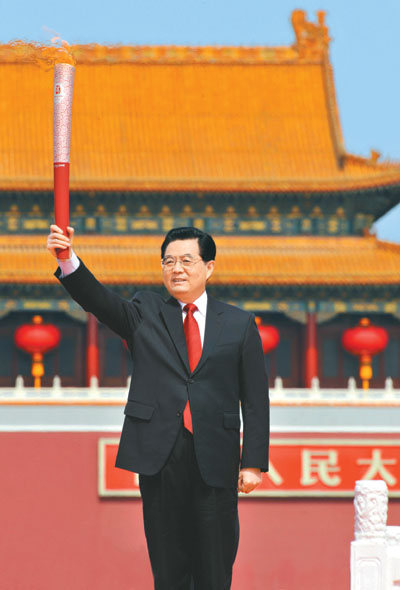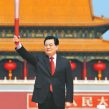
Hu Jintao Unveils Major Foreign-Policy Initiative
Publication: China Brief Volume: 9 Issue: 24

Chinese President Hu Jintao has signaled his administration’s readiness to play a bigger—and perhaps more constructive—role in global affairs through the release of a five-pronged foreign policy game plan. Cited by the official Outlook Weekly as “Hu Jintao’s Viewpoints about the Times,” this far-reaching initiative consists of five theories on, respectively, “the profound changes [in the world situation], constructing a harmonious world, joint development, shared responsibilities, and enthusiastic participation [in global affairs].” In a late November issue of Outlook Weekly (a mouthpiece of the Chinese Communist Party [CCP]), ideologue Zhang Xiaotong indicated that the party chief and president’s “viewpoints” amounted to a “major theoretical innovation” based on the “scientific judgment of the development and changes of the times.” This ambitious agenda has been unveiled after U.S. President Barack Obama’s visit to China and before the Copenhagen climate change summit, two events that could become milestones in the Middle Kingdom’s quest for quasi-superpower status.
According to National College of Administration (NCOA) Professor Wang Yukai, President Hu’s new-look diplomacy marked the first time that a contemporary Chinese leader had arrived at a comprehensive set of theories with an international perspective. He noted that the “viewpoints” would “undoubtedly provide a theoretical guideline for China’s future participation in global affairs.” More significantly, the CCP leadership’s rejiggered worldview can be interpreted as the CCP leadership’s response to a key point recently raised by President Obama, that Washington “welcomes a strong, prosperous and successful China that plays a greater role in world affairs.” While Premier Wen Jiabao, a close Hu ally, had disputed the G-2 characterization of China and America during his meeting with Obama, Beijing seems primed for evermore stellar performances on the world stage (Outlook Weekly [Beijing], November 24; Ming Pao [Hong Kong], November 25; Reuters, November 17).
In his 7,000-word article, Zhang, an editor at the Party Literature Research Center under the CCP Central Committee, collected foreign policy statements that Hu made on public occasions as well as in internal party conclaves. He cited Hu, who heads the CCP Leading Group on Foreign Affairs (which is China’s foremost policy-setting organ on the diplomatic and security fronts) as saying that the contemporary world had experienced “historic changes” and that the same could be said for China’s relations with the world. Saluting impressive gains in China’s industrial and technological prowess, Hu noted that the Chinese were living “in an era that is full of opportunities and challenges” —and that “the opportunities exceed the challenges.” The Chinese “economic miracle” has made it possible for the CCP Fourth-Generation leadership under Hu to make radical departures from late patriarch Deng Xiaoping’s famous diplomatic credo of “adopting a low profile and never taking the lead” in international affairs (Xinhua News Agency, November 24).
Not all of Hu’s “viewpoints” are new. The ideals of constructing a harmonious world as well as “joint development” especially with neighboring nations were first raised by former President Jiang Zemin in the late 1990s. The harmony concept, which harks back to the Confucianist ethos of shijiedatong (“commonality of the nations”), also means that China’s precipitous rise will not lead to conflicts with other countries. “Harmony” means the minimization of military and other conflicts. Whereas “joint development” is Beijing’s preferred solution to sovereignty disputes with Asian countries ranging from Japan to Vietnam and the Philippines (Xinhua News Agency, October 28, 2002; China News Service, April 9). Of the five components of the Hu leadership’s novel worldview, perhaps the twin theories of “shared responsibility and enthusiastic participation” are most significant. The idea that Beijing is willing to shoulder “shared responsibilities” for global obligations reflects the CCP leadership’s readiness to become what former U.S. Deputy Secretary of State Robert Zoellick called a “responsible stakeholder.” The “enthusiastic participation” imperative implies that Beijing will be acquitting itself of world affairs in a way that is commensurate with its quasi-superpower status. Theorist Zhang quoted salient passages from Hu’s speech in December 2008, which celebrated the 30th anniversary of the start of the reform era: “The future and fate of contemporary China is intimiately linked with the future and fate of the entire world.” The supremo went on to urge party and government officials to synthesize the goal of “upholding independence and sovereignty” with globalization so that the country can “make contributions to fostering humankind’s peace and development” (Xinhua News Agency, December 18, 2008; People’s Daily, November 25).
The year 2009 has seen Beijing appear to take the lead in a plethora of world issues. At the G-20 meetings in London and Pittsburg, Chinese diplomats called for the graduate replacement of the U.S. dollar as the “world currency.” They also lobbied successfully for an augmentation of the voting powers of developing nations in the World Bank and International Monetary Fund. Tens of billions in aid dollars have been pledged to poor nations during President Hu and Premier Wen’s meetings with African and Southeast Asian leaders (Xinhua News Agency, November 10; China News Service, November 11). Most importantly, Premier Wen will, at Copenhagen, reassure the international community of China’s commitment to fighting global warming: By 2020, China will cut “carbon intensity”—the amount of fossil-fuel emission per unit of economic output—by 40 to 45 percent from 2005 levels. At the same time, Beijing has led developing nations including India and Brazil in pressing the industrialized world to devote at least 0.5 percent of GDP to helping poor nations in areas including fostering green technology (Wall Street Journal, November 28; AFP, November 29).
Moreover, Beijing seems to have made at least selective modification to its long-standing principle of “non-interference in the internal affairs of other countries.” The Outlook Weekly article pointed out that China has joined more than 20 peacekeeping missions mandated by the United Nations, in addition to participation in efforts to resolve nuclear problems in North Korea and Iran, and ethnic conflicts in Sudan. During the China visit of President Obama, Beijing apparently acceded to Washington’s demands that it use its influence with Tehran to rein in the Middle Eastern country’s nuclear-weapons program (Washington Post, November 26). Late last month, China joined Russia and 25 other nations in endorsing an International Atomic Energy Agency (IAEA) resolution that called on Iran to immediately halt operations at its Qum uranium enrichment plant. The resolution also expressed “serious concern” about the military applications of the pariah state’s putatively peaceful nuclear facilities (New York Times, November 28; Xinhua News Agency, December 1).
Of course, there are limits regarding the extent to which this country with $2.2 trillion worth of foreign-exchange reserves and a population of 1.3 billion can do for global harmony and development. One of the five theories under “Hu Jintao’s Viewpoints” is that “various parties must observe the principle of mutually shared responsibilities.” This refers to Beijing’s insistence that its contributions to the global commonwealth be conditional upon commensurate inputs by other nations, especially developed countries and regions such as the United States and the European Union. Moreover, the Outlook Weekly article cited Hu as asking cadres to strike a balance between China’s internal development and its national interests on the one hand, and its globalization commitments on the other. Thus, Beijing has to to ensure that its international contributions will not adversely affect the country’s “core interests” in both the economic and diplomatic arenas. For example, given China’s reliance on smokestacks industries, the CCP leadership can only do so much to curb carbon emissions. Moreover, in light of China’s dependence on exports as an engine of growth, do not expect a significant appreciation of the renminbi in the foreseeable future (People’s Daily, November 17; Ming Pao, November 14; Wall Street Journal, November 26; Reuters, November 30).
These considerations will also form the parameters of Beijing’s international commitments regarding Iran and North Korea. Given China’s traditional quasi-alliance relationship with Iran—and its hefty investment in the latter’s oilfields—it may be unrealistic to assume that Beijing will go the distance in pressuring Tehran to jettison its nuclear ambitions. How the Hu leadership will draw the line between China’s dependence on Middle Eastern oil and its cooperation with the Western alliance will become clearer when the UN Security Council debates possible sanctions on Tehran early next year. It is also significant that Beijing has flatly refused to heed repeated requests from the United States, Japan, South Korea and other nations to use its clout with North Korea regarding Pyongyang’s equally ambitious nuclear gambit. The November visit to the DPRK by Chinese Defense Minister General Liang Guanglie, which came hot upon the heels of the North Korean tour of Premier Wen, has highlighted the “lips-and-teeth” relationship between the two socialist neighbors (Reuters, November 25; Washington Post, November 3).
Both in public addresses in recent years and in speeches cited by ideologue Zhang, Hu has stressed that China’s enhanced participation in global affairs will not affect its unique model of development. One of the president’s favorite arguments is that globalization means countries should respect and learn from each other so as to “safeguard the world’s pluralism and the multiplicity of development models.” The Fourth-Generation chieftain has also reiterated that Beijing will “ceaselessly explore and perfect a road [map] of development that is suitable to China’s national conditions” (People’s Daily, November 3; News.CCTV.com [Beijing], November 25, 2006). In other words, Hu and his colleagues are warning critics in the United States and Eruope that China’s enhanced globalization notwithstanding, the CCP will never introduce “Western” norms ranging from freedom of expression to multi-party politics. This perhaps explains why even as China’s top cadres and diplomats are throwing their weight around the globe, the country’s state-security personnel are working overtime to detain or intimidate hundreds of dissidents, activist lawyers and NGO organizers (AFP, November 14; The Associated Press, November 25).
NCOA’s Professor Wang has cited the possibility that “Hu Jintao’s Viewpoints about the Times” may be enshrined in the CCP Charter, perhaps at the 18th Party Congress slated for 2012. Given the unrestrained aggrandizement of Chinese influence around the globe, Hu might go down in history as a “foreign policy president” that has immensely raised the country’s profile. The Middle Kingdom’s enhanced participation in world events, however, has hardly been greeted with universal acclaim. The popularity of the “China threat” theory has testified to fears on the part of nations with disparate backgrounds about the possibility that the CCP leadership will use its unprecedented powers to pander to the growing legions of nationalists at home. Beijing’s continuing love affair with pariah states such as North Korea and Iran has aroused suspicions about its tendency to put narrow national interests above international peace and development. The onus is on the Hu leadership to convince the world that while Beijing must juggle its “core interests” and global commitments, its “active participation” in world affairs will at least be in line with those of the United Nations.





